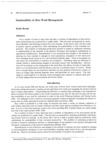Sustainability in Rice Weed Management
JIRCAS international symposium series
| ISSN | 13406108 |
|---|---|
| NII recode ID (NCID) | AA1100908X |

Full text
intlsymp-4_48-56.pdf418.98 KB
For a number of years in Asia, there has been a problem of degradation of the environment and declining rice productivity in paddy fields. This has been accompanied by declining profitability and declining incomes from rice farming. In the future, there will be a need to greatly improve productivity while maintaining the sustainability of that increased productivity. The problem of sustaining productivity growth is caused by inadequate attention to understanding of and response to the physical, biological and ecological consequences of agricultural intensification. Intensification in rice production and changes in the methods of
planting rice have resulted in changes in weed populations, emergence of new weed problems, including weedy forms of rice, and increased herbicide usage. There is increasing concern about the externalities of intensive rice production. Sustaining input use efficiency is closely related to understanding changes in the paddy system with intensification. Information will be required on the components of the weed flora, the effects of levels of weed infestation on crop performance and the efficacy and cost of potential means of control. Weeds have a strong impact on rice production and there are few practical alternatives to heavy reliance on tillage, high planting densities, water and herbicides for weed control. The challenge for weed research is to develop control strategies that maintain or enhance farm profits while safeguarding the environment and human health.
planting rice have resulted in changes in weed populations, emergence of new weed problems, including weedy forms of rice, and increased herbicide usage. There is increasing concern about the externalities of intensive rice production. Sustaining input use efficiency is closely related to understanding changes in the paddy system with intensification. Information will be required on the components of the weed flora, the effects of levels of weed infestation on crop performance and the efficacy and cost of potential means of control. Weeds have a strong impact on rice production and there are few practical alternatives to heavy reliance on tillage, high planting densities, water and herbicides for weed control. The challenge for weed research is to develop control strategies that maintain or enhance farm profits while safeguarding the environment and human health.
| Creator | Keith Moody |
|---|---|
| Publisher | Japan International Research Center for Agricultural Sciences |
| Available Online | |
| Issue | 4 |
| spage | 48 |
| epage | 56 |
| Language | eng |
